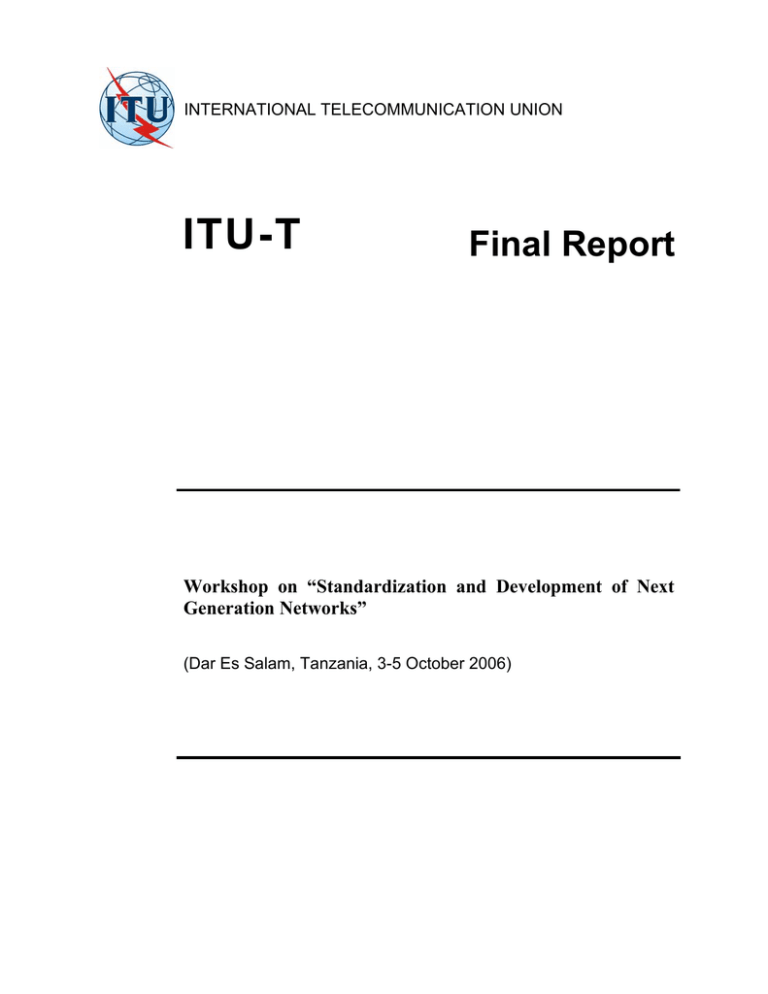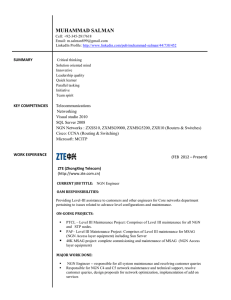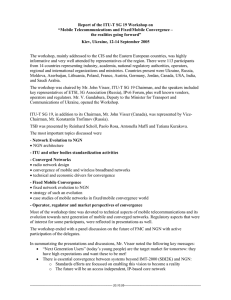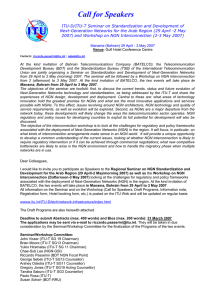ITU-T Final Report
advertisement

INTERNATIONAL TELECOMMUNICATION UNION ITU-T Final Report Workshop on “Standardization and Development of Next Generation Networks” (Dar Es Salam, Tanzania, 3-5 October 2006) At the kind invitation of the Tanzania Communications Regulatory Authority (TCRA), The International Telecommunications Union - Standardization Bureau (ITU-T) and the International Telecommunication Union – Development Bureau (ITU-D) jointly organized a workshop on “Next Generation Networks” which took place from 3-5 October, 2006 inclusive, at the Markham Suites Hotels, Dar Es Salaam, in the United Republic of Tanzania, The objectives of the seminar were two fold as the following: 1. To discuss the current trends, status and future evolution of Next Generation Networks technology and standardization, as being addressed by the ITU-T and share the experiences of NGN design, development and deployment. - Central to these included: a) What areas of technology innovation hold the greatest promise for NGNs? b) What are the most innovative applications and services possible with NGNs? To this effect, issues revolving around NGN architecture, NGN technology and quality of service requirements, as well as evolution were explored. 2. To discuss NGN regulatory and policy issues for developing countries and to exploit its full potential for development as NGNs are a major departure from today’s networks and these developments are likely to change the ways the telecommunications sector operates. TCRA Director General, Prof. John Nkoma opened the workshop with an opening address emphasizing on the challenges being faced in the ICTs Industry by Regulators and operators arising from the rapid advances in the development of ICTs. He further pointed out steps, taken by TCRA as a response to some of these challenges, like the introduction of the new Converged Licensing Framework which is technology neutral and service neutral. In the opening address that followed by Ms. Chali Tumelo from the ITU Regional office for Africa, the audience were reminded of the importance of ICTs Broadband Infrastructure development as one of the five Regional Initiatives for Africa emphasized in the outcome of the WTDC-06, WSIS Plan of Action and WSIS Tunis Agenda. The address stressed that national communications networks and infrastructure, through the use of ICTs, are much more than a mere platform for telephony but are now a fundamental underpinning layer of networked economies and Information Societies. Therefore the focus is on national and regional infrastructure which will form part of the Global information Infrastructure where NGN will play a central role. The opening remarks sent by the TSB Director, Mr. Houlin Zhao, pointed that the workshop was to provide an opportunity to share the progress made in NGN standardization and that it was vital for the developing countries to actively participate in the international standardization activities. TCRA was appreciated for inviting ITU to hold a seminar in Tanzania and for all the support rendered. All speakers, supporters including all ITU-T sector members who contributed to the workshop were appreciated. During the workshop, the status of works, following the success of the NGN Focus Group and the establishment of the NGN Global Standards Initiative (NGN-GSI) in ITU-T, was reviewed, identifying current and future technology trends and providing a framework for moving forward standardization work. In addition, technical, regulatory and development aspects of NGN were overviewed. Particular topics about the NGN architecture and QoS control, NGN services and applications, NGN migration scenarios, policy and regulatory issues were introduced. From the ITU Regional Office for Africa, structure, activities, projects and initiatives were introduced including Network Management and Development activities. In addition, the activities of ITU-D Study Group 2 Question 19-1/2 “Strategy for Migration from existing to Next Generation Networks (NGN) for developing countries” were presented. SPU of ITU discussed Policy and Regulatory issues in Networks in transitions emphasizing on emerging Policy and Regulatory Challenges of Next Generation Networks. During the panel discussions, participants raised interesting questions and topics of concern in the development and standardization of NGN and also that of migration to NGN. Participants showed clearly strong interest to know more about NGN. It was also noticed that in order to positively face all the NGN challenges, stakeholders in the ICTs industry wish to participate actively in all issues pertaining to NGN and for Africa there could not be a better opportunity than now when the NGN developments were in its infancy. Despite the invitation letters to the stakeholders (Regulators and Operators) were sent late, and the workshop being the first of its kind in Africa, participation was encouraging. There were a total number of 47 participants including speakers from Huawei (South Africa and China), NTT Japan, ETRI Korea, Nortel France, Cisco Sweden, ZNIIS Russia, TCRA, UCC, ITU-SG, ITU-T and ITU Regional Office for Africa. The workshop was delivered in English language only. There were active interactions from participants and the speakers tirelessly ensured that all the information and their rich experiences including the up to date knowledge on the ITU’s work were disseminated. Issues specially interested to developing countries from this region were raised during the Q&A Session, which include: How developing countries participate in ITU-T study? - Delegates from developing countries to this seminar felt they are not in a position of contributing to ITU-T, but rather a user of ITU-T recommendations. Thus, they’d rather rely to ITU-D for guidelines, manuals, implementer’s guide, etc. - In response, ITU regional office in Addis said they will setup a group to collect input from countries from African region to ITU-T. Delegates from South Africa Regulator raised the question of regulator’s puzzle on Emergency service vs. VoIP, Wireless Local Loop vs. Mobile Shortage of electricity power in some countries in this region was seen as a more fundamental challenge by some delegates of this seminar. They suggested that telecommunication manufactures should produce chargeable gadgets in reasonable prices for developing countries lack of electricity. Question about NGN equipment’s life duration triggered discussions: will/does it need to last 15 years like TDM? For newly developed service & technologies, different equipments will be needed in different stages, i.e. more mobile stations than fix lines. Landline in Africa is not workable. Mobile is the solution for communication in rural area. Will NGN bring in single-point-failure since voice, text, data are all on the same IP? How about the shortage of IP addresses? Thought the regulator should remain technology neutral and its role should be positioned as a facilitator and remain flexible enough to allow competition. Regulators from this region would like to be prepared in advance this time for NGN before it’s actually implemented. All presentations are posted on the web and can be accessed at http://www.itu.int/ITUT/worksem/ngn/200610/programme.html. Annex: Workshop Evaluation Result Of 47 participants, 17 returned the filled evaluation form. From the respondents, 24% indicated an overall ranking for the Workshop as —very satisfied“, 71% as —satisfied and 5% as —neutral“. The average overall ranking of the Workshop was: 4.2 To the question ‘Would you like to see another event on the same subject?’, 59% of respondents answered ‘yes’ and wanted it in the next 1-2 years, while 5% of the respondents said ‘no’.



